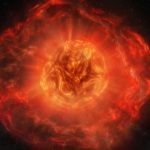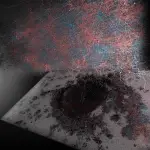Key Takeaways:
- The origin of our universe may be linked to black holes, with some physicists proposing that the singularity within black holes could give rise to new universes.
- Black holes are formed when massive stars collapse, creating an event horizon, a boundary beyond which nothing, not even light, can escape.
- The rapid expansion of the universe during the first trillionth of a second after the Big Bang parallels the growth of a black hole’s event horizon, raising intriguing questions about the nature of our universe.
- The idea suggests that our universe might be the event horizon of a four-dimensional black hole in another universe, challenging conventional notions and solving long-standing issues in cosmology.
- While the concept may sound complex, researchers from the Perimeter Institute and the University of Waterloo argue that the mathematical framework supports the possibility of our universe existing within a black hole.
The inception of our universe, a topic that has intrigued scientists and philosophers for centuries, may be entwined with the mysterious and colossal phenomena known as black holes. A group of physicists posits a groundbreaking theory that challenges traditional cosmological narratives, suggesting that our universe could have originated within the confines of a black hole’s singularity.
At the heart of this idea lies the concept that the singularity, an infinitely hot and dense point, found within black holes might serve as the cosmic womb giving birth to new universes. Remarkably, experts draw parallels between the singularity at the birth of our universe and the singularity present in black holes, hinting at a potential shared origin.
The formation of black holes occurs when a massive star reaches the end of its lifecycle, undergoing a collapse that compresses its core into an incredibly small space, where even light cannot escape. The boundary defining this point of no return is known as the event horizon, a region obscured from direct observation. Interestingly, as matter is drawn into the black hole, the event horizon expands, mirroring the growth patterns of our expanding universe.
During the initial trillionth of a second after the Big Bang, the universe experienced a rapid expansion exceeding the speed of light, reminiscent of the dynamics around a black hole’s event horizon. This parallel raises a tantalizing proposition: could our universe be the event horizon of a black hole within another universe?
Delving deeper into the complexity of this hypothesis, scientists note that three-dimensional black holes in our universe possess two-dimensional event horizons. Consequently, for our universe to be an event horizon, it must have originated from a four-dimensional black hole within a four-dimensional universe, a concept that challenges conventional understanding.
While the singularity within a black hole remains beyond the reach of direct calculation due to the breakdown of the laws of physics, researchers emphasize the significance of the information encoded on the event horizon as matter falls into the black hole. The growth of the black hole and its event horizon appears intricately linked, ensuring the surface area is precisely sized to encapsulate information about all matter that has entered since its inception, potentially representing the entire content of our universe.
Researchers from the Perimeter Institute and the University of Waterloo introduced this mind-bending hypothesis, highlighting its ability to address long-standing issues with the traditional Big Bang theory. The conventional hypothesis attributes the birth of our comprehensible, uniform, and predictable universe to the chaotic singularity, a notion that has sparked skepticism within the scientific community.
Contrastingly, the black hole hypothesis offers a cleaner, albeit challenging, perspective. It proposes a universe within a black hole within a universe within a black hole, suggesting a cosmic hierarchy with black holes playing a fundamental role in shaping the cosmos. As scientists continue to explore the mathematical underpinnings of this theory, the prospect of our universe existing within the enigmatic confines of a black hole opens new avenues for understanding the nature of our cosmic reality.


